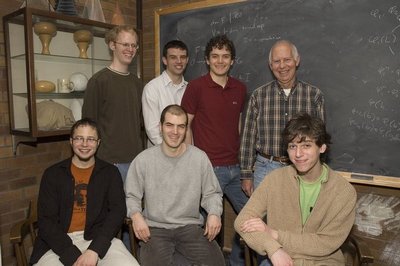May 3, 2007
UW undergrads dominate international math competition
They thought they had already had their proudest moment. But then this year they did even better.
Results of the 2007 Mathematical Contest in Modeling surpassed even the adviser’s high expectations. The 14 winning teams included entries from Harvard, Duke and MIT. And two teams from the University of Washington.
The undergraduate teams were chosen as Outstanding Winners of the grueling, 96-hour competition. And this year’s field was tougher than ever. Of 949 entries, more than two-thirds of the teams were from outside the United States.
“We’re extremely proud of our students. They’re fantastic,” said Selim Tuncel, chair of the UW’s department of mathematics. “Two Outstanding Winners in one year is an incredible achievement.” The members of the winning teams are Nate Bottman, Sam Burden, Aaron Dilley, Wes Essig, Lukas Svec and Sam Whittle.
The UW’s math department now counts seven wins in six years — a feat Tuncel jokingly compares to Lance Armstrong’s unprecedented seven Tour de France titles. “I think the excitement really builds,” Tuncel said. “Students in one year see students in the previous year winning, and it just snowballs.”
Coaching the teams was Jim Morrow, a professor of mathematics. Morrow began entering teams in the competition in 2001, when there were roughly half the number of entrants.
“Not only has winning not gotten old, but to me, it’s gotten more and more surprising,” Morrow said. “The competition has gotten far more difficult over time, as it’s become more of a worldwide contest.”
As always during the contest, sleep was in short supply.
“I advise the students to get enough sleep and tell them it’s a physical contest,” Morrow said. “That’s one of the reasons that I think young people are good at it.”
The entrants, ranging from sophomore to senior years, receive a choice of two questions revealed on a Thursday at 5 p.m. Both winning teams answered this year’s problem on gerrymandering: how to devise a fair, mathematical way to divide up states’ congressional districts.
For the next four days the students could research the problem in libraries or online, but they were barred from communicating with friends, family or professors. Team members work closely together from dawn until long after dusk, sharing computer programming, mathematics research and report-writing duties.
Asked to describe the experience, Dilley responded: “Two words: mentally exhausting.” Names and affiliations are removed from the final submissions so they can’t influence the judges’ decisions.
“The skills that you learn are really marketable. Teamwork, problem-solving, how to communicate ideas,” said Burden. Soon after the contest results were announced, a data analyst at Google e-mailed the winning members and encouraged them to apply for a position. Winning team members are often recruited by companies such as the National Security Agency, Microsoft and investment company D.E. Shaw, Morrow said.
This is not only local teams but pure Northwest talent. All but one of this year’s winners hail from Washington state. The exception, Essig, is from Idaho.
“The local people ought to be pretty proud of them,” Morrow said.
Burden, Dilley and Svec all attended the first Summer Institute in Mathematics at the UW, the department’s outreach program for mathematically talented high school students, in 2003. In addition to the Outstanding Winner title, their solution also earned the Mathematical Association of America prize.
UW’s student winners are:
Team 1:
- Nate Bottman, sophomore, mathematics and applied math, Seattle.
- Sam Whittle, junior, computer science, Bellingham, Wash.
- Wes Essig, senior, mathematics, Boise, Idaho (two-time winner).
Team 2:
- Sam Burden, junior, computer engineering and electrical engineering, Spokane, Wash.
- Aaron Dilley, sophomore, mathematics, Spokane, Wash.
- Lukas Svec, senior, physics and mathematics, Oroville, Wash.



